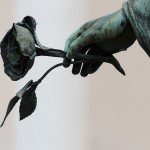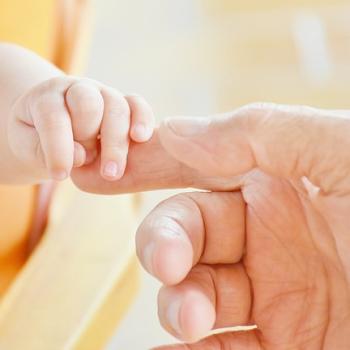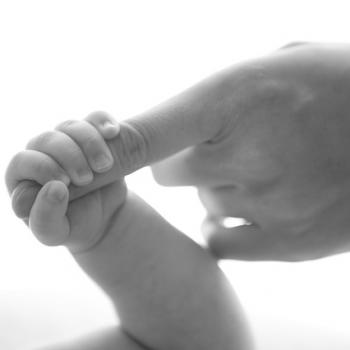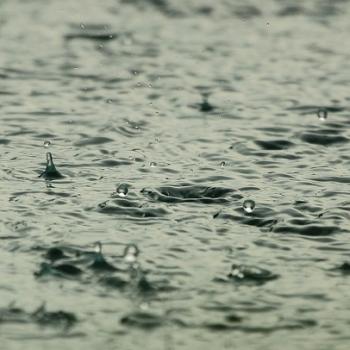“When it’s dark,” the woman went on, near a whisper, “They can’t sustain the blue. The blue is an illusion they throw up to hide all the holes. Everyone can see the holes at night. We call them stars. We chart their paths. We use them to trace shapes and tell our fortunes. Everybody knows they’re important, but we forget what’s most obvious: the stars are holes in the lid. They were drilled to let the steam out. If we got close to them, we could get out too. Then you’d be outside for the very first time. Then you’d be free, and they couldn’t make you do anything anymore. You could have anything you wanted. Once you’ve been up there, they can’t make you go back down.”
“Are you sure about that?” This wasn’t a particularly clever thing to say, but the woman had paused as if she expected me to say something.
The woman had been smiling; she frowned now, and sunk against the back of the seat. “No. At least… I’m sure the stars are holes. But what if, when we got outside, we found another lid? A larger lid? And what if it didn’t have any holes? What if getting outside only meant losing our last hope?”
I looked back out the window. The red and white lights kept whirring by the window, blurred, abstract, like comets or shooting stars. I couldn’t tell where on the highway we were, what part of town we were in. We could have been anywhere in the universe or outside of it, and I wouldn’t have known.
“How can we find out?” I asked.
“We’ve got to get to Polaris. The answer is there. It must be. Polaris is the last stop.”
She sounded so genuinely frightened that I turned to her.
Her face was pained but stoic; she pressed her lips in a thin line. Her eyes looked ready to fill with tears, but she would not let the tears come.
I saw a little dent over her left eyebrow, and another on her left cheek. They were so small, you would never have noticed them if you hadn’t been looking carefully. They were very old, after all. I’d gotten those scars when my babysitter’s little brother pinched me. He was two; I wasn’t even six months old. I bled all over but the emergency room doctor said I didn’t need stitches. He’d told my mother they would heal, they’d be almost invisible, and he was right.
I leaned against the window, and touched my scars.
The woman with the same scars still looked frightened, but she smiled.
“This is the hard part,” she said.
She was me. She was older than I was by a good twenty years, but other than that, she looked exactly like me. Her hair, skin and eyes were my color. Everything about her was unremarkable and ordinary because it was exactly like me—not someone else, someone different who drew my attention. I was looking at myself.
“You see,” she said, “You’re going to live through this.”
“Is that a good thing?” I pleaded.
She—or rather, I—looked puzzled. “I don’t know yet.”
I started to cry now, and so did she. But my tears were heavy. Hers were light—a tear out the corner of each blue eye, down sharply through the lines on her face.
“Let’s get to the last stop first. Let’s get to Polaris, and then I’ll tell you. From there, I can tell if it’s good that we lived.”
I closed my eyes and cried, still holding my own hand.
When I opened them, the ugly old woman across the aisle was staring at me. I noticed the blue of her eyes again; I noticed the similarity in the shape of her face, something familiar about those knotted hands.
“Is she… is she us? Is she me too?”
“No,” said the woman next to me. “You’ll never live to see her when she looks like that. That’s your daughter.”
I didn’t know if the shooting sensation inside of me was relief or terror.
“You mean I’m not getting the abortion?”
“You decided not to last week, didn’t you?”
For the first time, I admitted to myself that I had. The sensation came again, and this time I knew that it was both relief and terror at once.
“I need to throw up,” I said.
“There’ll be lots of that.”
I bit my lip until the sensation passed.
“They have medicine for it these days,” said the woman who was really me. “The new doctor will give you some. But it doesn’t help very much.”
“They say it goes away at twelve weeks.”
“Fourteen.”
I don’t know what made me keep questioning her—myself. “Is… is he ever going to come back?”
“No,” she said flatly. “He met another woman. He’s deeply in love with her. They’ll have two children, plus a miscarriage. That will break his heart.”
“What about her?” I asked, gesturing to the old woman. “Will she be happy? Will she be glad we lived through this?”
Now the woman looked worried. “I don’t know,” she said. “Ask when we get to the last stop.”
Just then, the bus gave a huge lurch.
I pitched forward in my seat; my forehead struck the soft vinyl of the bench in front of mine. Bile rose in my throat, but I choked it back. I let go of the woman next to me, the woman who was my older self. Protectively, I clutched my thick, hard abdomen.
“Last stop,” said the driver.
“What?”
“Polaris,” said the driver. “It’s the last stop.”
“That’s impossible,” I said. But I got up anyway.
The other seats were empty.
I was the only passenger.
I made my way to the front, and down the steps.
I stood on the little island, between the sign and the ashtray. The cars zipped back and forth—white lights coming toward me, red lights going away, too fast for anyone to notice, too fast for anyone to stop. Far in the distance was a walk light, almost comically small, the light a steady red. Beyond it was the parking lot with the strip mall’s signs lit up for the evening.
Above the mall, above the street, above everything was the lid—the sky, perfectly clear and littered with stars.
(image via Wikimedia Commons)
















